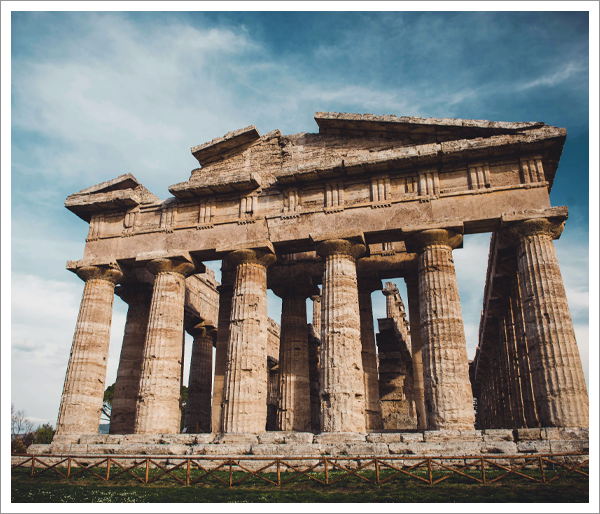info@dasbellaitalien.com
Paestum is a locality located in the Campania region, in southern Italy, famous for its ancient archaeological remains and the majestic ruins of Greek temples. Founded around the 7th century BC by Greek colonists from Sibari, Paestum became a flourishing city of Magna Graecia, known as “Poseidonia,” in honor of the Greek god of the sea, Poseidon. After its conquest by the Lucanians, it was called Paistom, and later, under the Romans, it assumed the name Paestum. During the Roman period, Paestum lost its strategic importance and was gradually abandoned. However, its ruins remained intact and were rediscovered in the 18th century.

The temples of Paestum constitute one of the best examples of Greek architecture from antiquity. In total, three temples are well preserved: the Temple of Neptune, the Temple of Hera (also called the Basilica), and the Temple of Athena (also called the Temple of Ceres), all dating back to the 6th century BC. The temples of Paestum are in the Doric style and are easily recognizable by the decorative architectural elements present at the top of the columns called “capitals.” The capitals are carved with unique decorative forms, such as the Ionic capital with its elegant volutes, the Doric capital with its simple echinus form, and the Corinthian capital with its intricately carved acanthus leaves. These capitals not only bestow beauty and grace upon Greek architecture but also express the aesthetic and cultural ideals of that civilization, making them precious testimonies to the artistic genius of ancient Greece.

The National Archaeological Museum of Paestum is an essential stop for those visiting the magnificent archaeological area of Paestum. This museum, inaugurated in 1952, houses a rich collection of artifacts that narrate the millennia-old history of the area, from its foundation as a Greek colony to the Roman period. The museum is divided into different sections, each dedicated to a specific period in the history of Paestum and its ancient surrounding cities. Among the most significant works on display are sculptures, reliefs, and art objects from the temples of Paestum, including the metopes and Doric friezes that adorned the monuments. One of the masterpieces of the museum is the famous Tomb of the Diver, a painted tomb dating back to the 5th century BC, discovered in 1968 in the archaeological area of Paestum. This fresco depicts a young man in a diving pose, a symbol of rebirth and immortality in ancient Greek culture. In addition to artworks, the Archaeological Museum of Paestum also hosts a section dedicated to daily life in ancient Poseidonia, with ceramic artifacts, coins, jewelry, and household utensils providing valuable information about society and traditions of the time.

Useful information:
Rates:
The ticket is valid for 3 days and includes access to the Archaeological Area and the Museum of Paestum, as well as the Archaeological Area of Velia.
From December to February: Full price: €10.00 Reduced (youths from 18 years to the day before their 25th birthday): €2.00
From March to November: Full price: €15.00 Reduced (youths from 18 years to the day before their 25th birthday): €2.00
Ticket office: Museum of Paestum: You can buy the ticket inside the Museum of Paestum. Main Ticket Office at Porta Principale: This ticket office is located in front of the Temple of Neptune.
For more information, visit the website: https://museopaestum.cultura.gov.it/orari-e-biglietti/
How to reach Paestum:
By car: If you have a car or rent one, you can reach Paestum via the highway. Paestum is located along the SS18 national road, which connects Salerno to Reggio Calabria. From Salerno, you can take the A3 motorway southbound and then exit at Battipaglia, from where you can follow the signs to Paestum.
By train: Paestum has a train station on the Naples-Reggio Calabria line. You can take a train from Naples or Salerno and get off at Paestum. The station is a short distance from the archaeological area, so you can continue on foot or take a taxi/bus to reach the archaeological site.
Would you like to experience a dream visit to this wonderful city and its archaeological site? Contact the team at Das bella Italien and let them advise you. Fully experience the city of Paestum!


